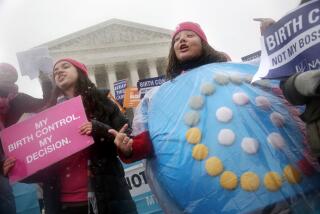Cites Need for More Data, Urges Education Program : Panel Cautious on Breast Implant Ban
- Share via
WASHINGTON — A federal advisory panel, responding to concerns that silicone breast implants may carry health risks, said Tuesday that there is not enough evidence of cancer among implant patients to warrant an immediate ban of the devices.
The panel, which included seven health experts, based its research on testimony from 16 witnesses, including consumer advocates, health experts, attorneys and implant patients, as well as two earlier studies on the possible health risks of breast implants.
The advisory committee, acknowledging that more research needs to be conducted before a decision is made on the implant issue, will reconvene in two months to review any additional evidence before making a final recommendation to the Food and Drug Administration, agency spokesman William Grigg said in an interview.
Education Program
For now, the advisory committee urged the FDA to develop a program to educate women seeking breast implants about the possible health hazards associated with them and to establish an information-collecting agency devoted to breast implant surgery.
“The panel has provided us with a thoughtful and wide-ranging series of recommendations that will help us to take prompt action to learn more about the potential risks of breast implants and to inform physicians and their patients about what is known,” FDA Commissioner Frank E. Young said in a statement released late Tuesday.
Some witnesses testifying before the panel asked for a ban on silicone-gel breast implants, charging that manufacturers have not adequately tested the devices for safety and that women have not had access to information about the possible hazards of the surgery.
Sybil Niden Goldrich, a breast cancer victim from Beverly Hills who received implants in reconstructive surgery, said that she had five operations over a 10-month period, with no warnings from doctors about the possible health risks.
“Implant intact, woman broken,” she said, referring to the trauma she endured when problems arose during the reconstructive surgery. “These implants rival Samsonite luggage for toughness--I don’t.”
The FDA has said that it is giving manufacturers until December, 1990, to study their breast implant devices and report their risks and benefits to the agency, according to spokesman Robert Sheridan. Then the agency will decide whether to ban the devices, which have been used by 2 million U.S. women since they came on the market in the 1960s.
Of the 130,000 women who receive implants each year, it is uncertain how many of them develop complications, said Dr. Nirmal Mishra, an FDA researcher. “We don’t know the consequences (of implant surgery, but the possible health effects are) a cause of concern,” he said.
Possible short-term effects of implant surgery include hardening of the silicone gel, leakage or rupture of the implanted sacs and interference with mammograms, images used to detect breast cancers. In the long term, implant patients might be at risk for cancer, Sheridan told the panel, although evidence of this remains incomplete.
Dr. Sydney Wolfe, director of the Public Citizen Health Research Group, said that safety studies should be required for any implanted device before it is marketed and that implant patients should have annual checkups for at least 10 years after the surgery.
“It is likely that each year many thousands of women need to have their breast implants removed,” he said. Wolfe added that it is “a disgrace” that a study has not been done to determine the health effects of these implants.
More to Read
Sign up for Essential California
The most important California stories and recommendations in your inbox every morning.
You may occasionally receive promotional content from the Los Angeles Times.










